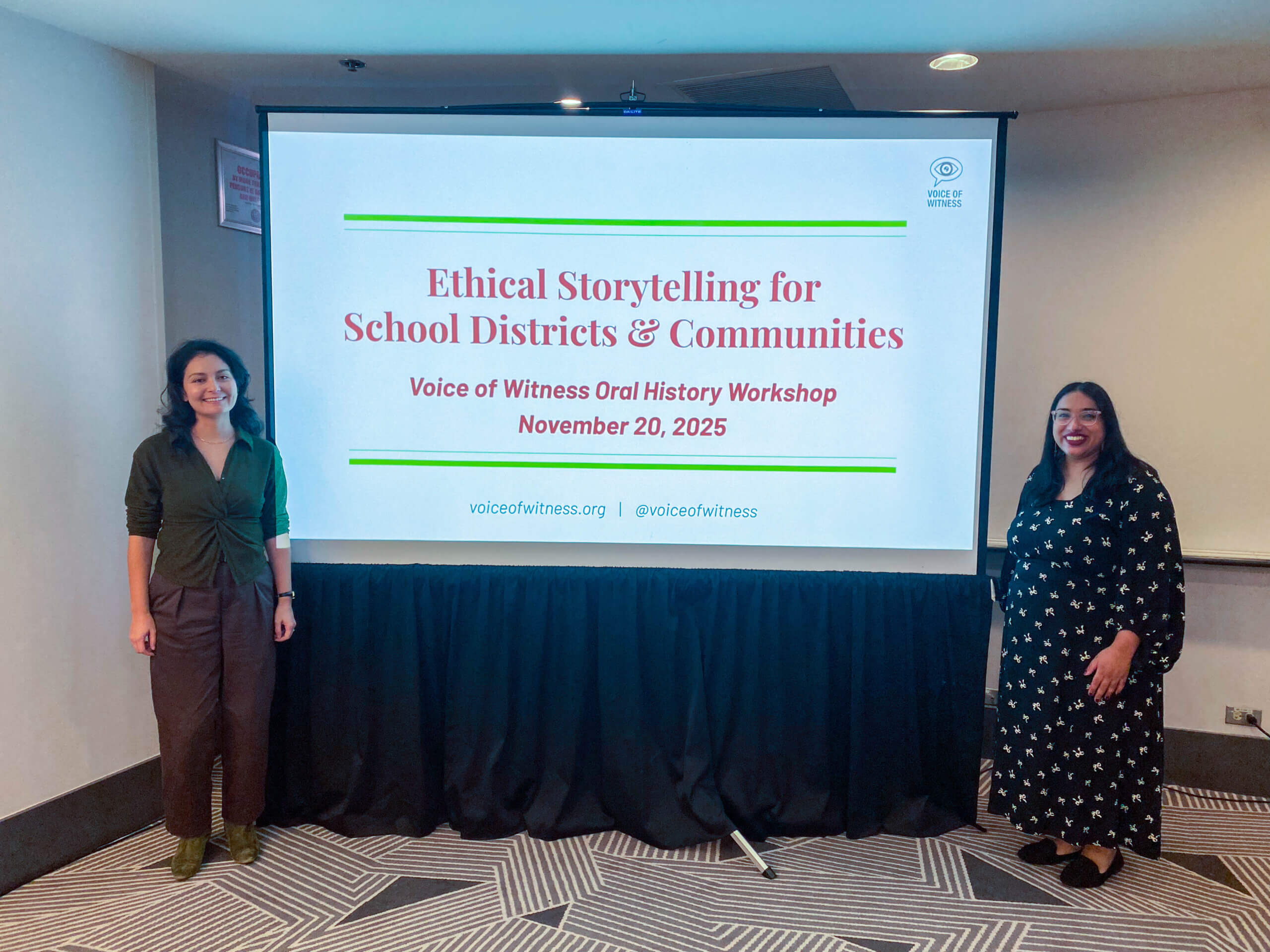
By Claire Sorrenson
Claire Sorrenson is a former Voice of Witness Education Program Intern with a passion for telling stories that drive social change. Claire currently works in the nonprofit communications sector.
By now, anyone concerned with education or storytelling has probably heard Chimamanda Adichie’s TED Talk called “The Danger of a Single Story.”
In her talk, Adichie recounts her various interactions with the single story: as a young Nigerian girl, steeped in Western literature, who believed that all her stories must feature blonde, blue-eyed protagonists, and later as a university student in America whose roommate could not reconcile this English-speaking, Mariah Carey-listening woman with her idea of an “African.” Adichie explains, “The single story creates stereotypes, and the problem with stereotypes is not that they are untrue, but that they are incomplete. They make one story become the only story.”
When I first heard Adichie’s talk, it gave form and substance to the nameless discomfort I’d felt whenever I encountered a single story. So this, I thought, is why I get queasy when I see the latest charity appeal populated by nameless African orphans. This explains my fury whenever a joke’s punch line is, “Because-women/black people/poor people-ha-ha.” Adichie’s conceptualization of the single story helped justify the work that I wanted to do as a storyteller and an educator. The single story is why oral histories matter, why the subaltern must speak, why we continue to try and teach students amorphous concepts like “empathy.”
But I wondered: what makes the single story actually, physically dangerous? Isn’t it just that—a story? To Adichie, “The consequence of the single story is this: It robs people of dignity. It makes our recognition of our equal humanity difficult. It emphasizes how we are different rather than how we are similar.” Ok, I thought. But how does the single story impact our daily, lived realities?
Darren Wilson’s Single Story
When 18-year-old Michael Brown was shot in August of 2014, communities responded with actions full of anger and beauty, and our justice system was put on trial and found lacking. With Darren Wilson’s non-indictment came his testimony, a single story propelled by racist fear.
Describing their initial altercation, Wilson said, “When I grabbed him, the only way I can describe it is I felt like a five-year-old holding onto Hulk Hogan…that’s just how big he felt and how small I felt just from grasping his arm.” Never mind that Wilson himself is a 210-pound, six-foot-four man. Never mind that he was inside his police SUV, armed, radioed, carrying all the trappings of power that a police officer does in our country. Under his hands—and through his words—Michael Brown took on the powers of a superhero.
According to Wilson, the men continued to tussle. Wilson shot Brown and Brown started running away. Then Brown turned around: “He looked up at me and had the most aggressive face. The only way I can describe it, it looks like a demon, that’s how angry he looked. He comes back towards me again with his hands up. At this point it looked like he was almost bulking up to run through the shots, like it was making him mad that I’m shooting at him. And the face that he had was looking straight through me, like I wasn’t even there, I wasn’t even anything in his way.” Here, Brown transforms from superhero to superhuman; a “demon,” a blank-faced aggressor who swats bullets aside like they’re flies.
Wilson shot Brown several times: “When [the bullets] went into him, the demeanor on his face went blank, the aggression was gone … the threat was stopped.” Here, finally, Darren lays bare the truth of his single story: Brown was not a human but a threat that Darren felt compelled to combat. He did so, and “it was gone.”
“Show a People As One Thing, and That Is What They Become”
Now, I am not here to examine the truth of Darren Wilson’s statement. Nor will I dive into how Darren Wilson’s story of black men in America became so singular: how a young man walking down the street could transform in Wilson’s mind into a “Hulk Hogan,” a “demon,” bulletproof, blank-faced, gone. (Others have done so here and here).
I return instead to Adichie: “So that is how to create a single story. Show a people as one thing, as only one thing, over and over again, and that is what they become.” A father like Eric Garner becomes another superhuman to be grappled to the ground; a 12-year-old like Tamir Rice becomes another threat to be neutralized within seconds. In the death of Michael Brown, we encounter the real tragedy of the single story: it silenced a young man in the most fundamental way possible. We will never hear his story.
Storytelling From Below
If we acknowledge that stories have power, then storytelling-from-below becomes a revolutionary act: a way to fracture and eventually dismantle the dominant narratives. The question that I keep returning to is this: what stories could have changed the course of Darren Wilson’s actions? What if he had studied accounts of police brutality in high school? Read oral histories about the lives of black men in America? Undergone police training that discussed how and why we hold the racial biases that we do? Talked to young men in the neighborhoods where he worked? What if he had known that Michael Brown loved video games, and was exploring his religious beliefs, and rapped, and planned to go to technical school, and acted up like all teens do; that Michael Brown was human?
The answer is that maybe none of these stories would have changed Darren Wilson’s actions. Or maybe they would have. Storytelling is unpredictable. I often struggle with this nuance. If stories are so nebulous, if their effects can’t be tracked, if we can’t ensure they will affect the actions of even a single person, then why bother telling them? But I know the answer to this question, too.
We can’t afford not to.




